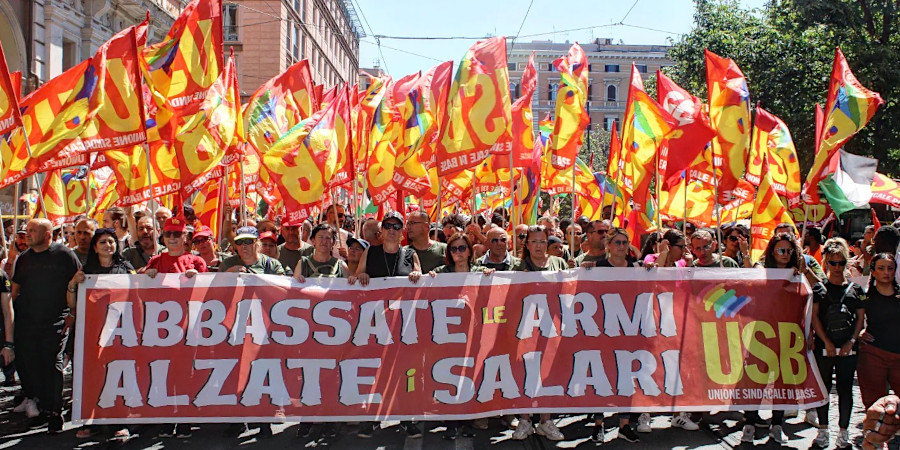| english | español | français | italiano |
With the Unione Sindacale di Base’s general and generalised strike on December 13th
Rete dei Comunisti / Cambiare Rotta – Organizzazione giovanile comunista / OSA (Opposizione Studentesca d’Alternativa)
The Unione Sindacale di Base (USB) has called a general and ‘generalised’ strike for Friday 13 December, which we strongly support.
At the heart of USB’s demands is a legitimate opposition to the policies of this government that impact, both in terms of social guarantees and trade union-political freedoms, the general condition of workers in this country; workers who have already been exhausted by at least two decades of wage deflation policies, restriction of trade union rights and absolute disregard for their health and safety conditions, as unfortunately certified by the constant slaughter of workers and the increase in ‘occupational’ diseases.
For the trade union what is fundamental is tackling head-on the issue of the industrial crisis and its dramatic implications for those employed in the manufacturing sector, a sector that had already emerged with broken bones from the crisis of the second half of the first decade of the 2000s and from the previous production restructuring processes that started in the 1980s, which had changed the physiognomy of the country-system while demolishing the achievements obtained through years of very hard struggles.
The current industrial crisis is not only affecting the peripheral countries of the European Union, but the very ‘centre’ of its productive structure, directly affecting the Franco-German axis that had been the driving force behind the construction of the Union since the Maastricht Treaty, at the beginning of the 1990s, and is demolishing the development model that it had created and whose distortions are now becoming evident.
The ruling classes of the aforementioned countries and, in general, the continental political elites, including our government and its political-parliamentary ‘opposition’, do not seem to have any credible recipes, other than favouring a mix of austerity and authoritarianism and laying the foundations for the construction of a real war economy based on the conversion for war purposes of an important part of the production apparatus and the research and training chain increasingly linked to the military-industrial complex.
The economic devastation that the choices made in recent years in Brussels and by individual national executives are causing have precise political repercussions, as we have seen with the calling of early parliamentary elections in Germany and the fall of the government in France, the result of the growing, and in some ways irreversible, delegitimization of a political class that has ensured the freedom of profit for companies at the expense of every most elementary guarantee for the subordinate classes.
What we are witnessing is the failure of a development model within the systemic crisis of a mode of production that makes the competition between political blocs fierce on the economic level and that increasingly has as its outlet the war of war; a ruthless competition that is reaping the residual guarantees even of those sectors of workers that felt relatively protected against the rampant social precariousness and the growing impoverishment of the working classes.
The effects of the crisis, after having been dumped for decades on the shoulders of the subaltern classes in the so-called PIGS (Portugal, Italy, Greece) and Eastern Europe, or among the less protected groups in the countries of the centre, affect everyone and everyone, and force us to come to terms with the need to impose a radical change of course with respect to the policies implemented so far, and basically accepted by large strata of the subaltern.
Against the downward homogenisation of working and living conditions, a clear and decisive response is possible that nails the government and the bosses to their responsibilities, puts collective action back at the centre as an instrument to improve their condition and the confederal initiative as a prospect of recomposition of a class unwilling to think beyond the walls of its own company or the narrow confines of its own category.
In these months the legitimate ‘intolerance’ of important sectors of the labour world is turning into a precise refusal to continue to pay for the choices of a political-economic power plot in cahoots with some confederal unions, through strikes and mobilisations in various sectors that can only find in the general strike of the 13th a reinforcement of their demands and a revival of their specific reasons for being pissed off.
This trajectory of the resumption of class conflict in our country cannot find an adequate foothold in those trade union and political organisations that have supinely accepted and made people accept the choices made by the European economic oligarchies and the technocrats who embody their interests – including Monti and Draghi – and necessarily passes through the construction of an independent political/trade union opposition and the ‘breaking’ of the compatibility cage modelled on the interests of both big European capital and that part of the ragged and parasitic bourgeoisie in our country.
In this context, communists in our country are called upon to be an instrument of class recomposition by supporting the paths of combative and confederal trade unionism of the USB as a necessary basis for rebuilding an organised and independent labour movement against the current executive, the political leadership of the EU and the reactionary warmongers of NATO.
This is why we support the general and generalised strike of December 13th and will participate largely in the two planned demonstrations that will start in Rome at 9:30 a.m. in Piazzale Tiburtino and in Milan at 10:00 a.m. at Porta Venezia.

